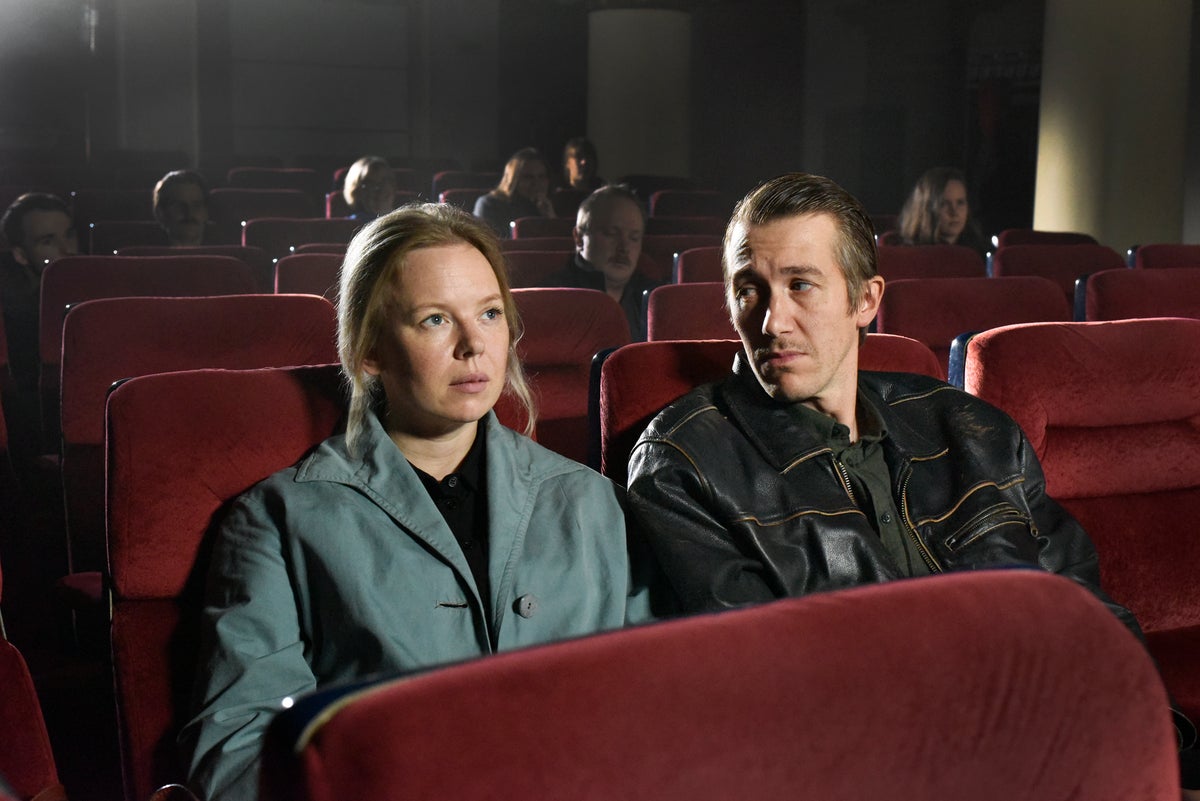
In a movie year rife with grand, three-hour opuses from auteur filmmakers comes a slender 81-minute gem that outclasses them all. Aki Kaurismäki’s “Fallen Leaves,” short, sweet and utterly delightful, is the kind of movie that’s so charming, you want to run it back the moment it’s over.
Kaurismäki, the writer-director Finnish master of the deadpan, has for nearly four decades been making minimalist, clear-eyed fables about mostly working-class characters in harsh economic realities. Bleak as his films are, they’re also funny, compassionate and profound. They put up a tough, droll front that never quite hides the heart underneath.
The same could be said for one of the main characters in the plaintive and tender “Fallen Leaves." When Holappa (Jussi Vatanen), a construction worker, is invited by his friend Houtari (Kaurismäki veteran Janne Hyytiäinen) to karaoke, he replies: “Tough guys don’t sing.”
“You’re not a tough guy,” Houtari responds.
“Fallen Leaves,” Kaurismäki's first since 2017’s “The Other Side of Hope,” is about Holappa and a woman named Ansa (Alma Pöysti), both solitary people scraping by in Helsinki. They first encounter each other at that karaoke bar where Houtari proudly sings (for the rest the rest of the movie, whenever he appears he’ll be seeking compliments for his performance), but Ansa and Holappa watch quietly apart.
Kaurismäki draws them together, but slowly. “Fallen Leaves” is the best big-screen romance of the year even though its prospective lovers exchange only a handful of words and, for most of the film, don’t know each other’s names.
It’s more about the circumstances they’re both in. In the beginning of the film, Ansa is working at a supermarket while a security guard glares at her. She’s fired for keeping an expired item instead of throwing it away. At home, she looks at her bills and then shuts the power off. Her next job, at a restaurant, fizzles on pay day when the owner is arrested for selling drugs.
Holappa loses his job, too. After an accident at a construction site due to shoddy equipment, he’s fired for having alcohol in his blood. He’s a scapegoat, but the drinking problem is real. He keeps vodka in his locker and hidden on the job site.
“I’m depressed because I drink and I drink because I’m depressed,” he tells Houtari.
The cinematography of longtime Kaurismäki collaborator Timo Salminen is so spare, with occasional pops of color and irony, that “Fallen Leaves” has a timeless feeling. It casts the cruelty of the world as an eternal state, a sense only enhanced and expanded upon in the most precise contemporary reference of the film. Whenever Ansa turns the radio on, news from the war in Ukraine is being read.
In Kaurismäki’s film, the world is full of bullying authorities. (His radiant 2011 film “Le Havre,” about an old French shoe shiner helping a migrant boy, hinged on a police officer who in the climactic moment choses to look the other way.) In “Fallen Leaves,” the only thing to do is curse the jerks who make life miserable, have a drink and head to the movies.
That’s where Ansa and Holappa go, once they finally meet, for a date. They see Jim Jarmusch’s “The Dead Don’t Die,” a funny choice not just because it’s a zombie comedy but because Jarmusch, a friend of Kaurismäki’s, is so similar in deadpan style to him. Outside, the couple stands in front of telling posters: “Le Cercle Rouge,” “Fat City,” “Pierrot le Fou" — each a touchstone to the director.
It’s little odes to cinema like these that make “Fallen Leaves” — winner of the jury prize at the Cannes Film Festival and Finland’s Oscar submission — one of the most personal and self-reflective films for Kaurismäki. He probably wouldn't stand for all the analysis or the praise. But as Ansa and Holappa come together without a word of flowery romance, they carve out a small, private refugee from the world around them — just like the movies do. There isn't a bit of fat on “Fallen Leaves,” just some lean truths about life and a dog named Chaplin.
“Fallen Leaves,” a Mubi release, is unrated by the Motion Picture Association. Running time: 81 minutes. In Finnish with English subtitles. Four stars out of four.







